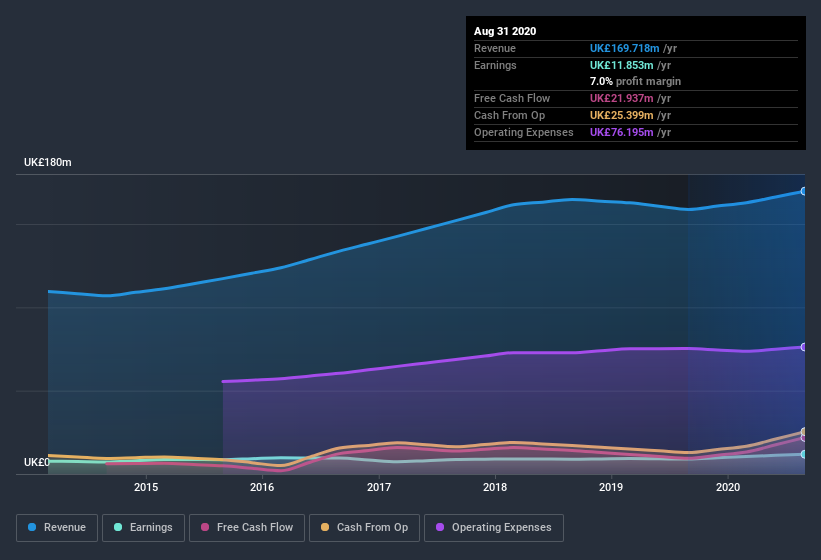- United Kingdom
- /
- Media
- /
- LSE:BMY
Bloomsbury Publishing's (LON:BMY) Earnings Are Growing But Is There More To The Story?

It might be old fashioned, but we really like to invest in companies that make a profit, each and every year. Having said that, sometimes statutory profit levels are not a good guide to ongoing profitability, because some short term one-off factor has impacted profit levels. Today we'll focus on whether this year's statutory profits are a good guide to understanding Bloomsbury Publishing (LON:BMY).
It's good to see that over the last twelve months Bloomsbury Publishing made a profit of UK£11.9m on revenue of UK£169.7m. One positive is that it has grown both its profit and its revenue, over the last few years.
See our latest analysis for Bloomsbury Publishing

Not all profits are equal, and we can learn more about the nature of a company's past profitability by diving deeper into the financial statements. In this article we will consider how Bloomsbury Publishing's decision to issue new shares in the company has impacted returns to shareholders. That might leave you wondering what analysts are forecasting in terms of future profitability. Luckily, you can click here to see an interactive graph depicting future profitability, based on their estimates.
In order to understand the potential for per share returns, it is essential to consider how much a company is diluting shareholders. In fact, Bloomsbury Publishing increased the number of shares on issue by 5.4% over the last twelve months by issuing new shares. Therefore, each share now receives a smaller portion of profit. To talk about net income, without noticing earnings per share, is to be distracted by the big numbers while ignoring the smaller numbers that talk to per share value. Check out Bloomsbury Publishing's historical EPS growth by clicking on this link.
How Is Dilution Impacting Bloomsbury Publishing's Earnings Per Share? (EPS)
As you can see above, Bloomsbury Publishing has been growing its net income over the last few years, with an annualized gain of 37% over three years. And at a glance the 32% gain in profit over the last year impresses. On the other hand, earnings per share are only up 29% in that time. So you can see that the dilution has had a bit of an impact on shareholders. Therefore, the dilution is having a noteworthy influence on shareholder returns. And so, you can see quite clearly that dilution is influencing shareholder earnings.
In the long term, earnings per share growth should beget share price growth. So it will certainly be a positive for shareholders if Bloomsbury Publishing can grow EPS persistently. However, if its profit increases while its earnings per share stay flat (or even fall) then shareholders might not see much benefit. For that reason, you could say that EPS is more important that net income in the long run, assuming the goal is to assess whether a company's share price might grow.
Our Take On Bloomsbury Publishing's Profit Performance
Bloomsbury Publishing shareholders should keep in mind how many new shares it is issuing, because, dilution clearly has the power to severely impact shareholder returns. Therefore, it seems possible to us that Bloomsbury Publishing's true underlying earnings power is actually less than its statutory profit. Nonetheless, it's still worth noting that its earnings per share have grown at 34% over the last three years. Of course, we've only just scratched the surface when it comes to analysing its earnings; one could also consider margins, forecast growth, and return on investment, among other factors. If you want to do dive deeper into Bloomsbury Publishing, you'd also look into what risks it is currently facing. At Simply Wall St, we found 1 warning sign for Bloomsbury Publishing and we think they deserve your attention.
This note has only looked at a single factor that sheds light on the nature of Bloomsbury Publishing's profit. But there are plenty of other ways to inform your opinion of a company. For example, many people consider a high return on equity as an indication of favorable business economics, while others like to 'follow the money' and search out stocks that insiders are buying. So you may wish to see this free collection of companies boasting high return on equity, or this list of stocks that insiders are buying.
If you’re looking to trade Bloomsbury Publishing, open an account with the lowest-cost* platform trusted by professionals, Interactive Brokers. Their clients from over 200 countries and territories trade stocks, options, futures, forex, bonds and funds worldwide from a single integrated account. Promoted
Valuation is complex, but we're here to simplify it.
Discover if Bloomsbury Publishing might be undervalued or overvalued with our detailed analysis, featuring fair value estimates, potential risks, dividends, insider trades, and its financial condition.
Access Free AnalysisThis article by Simply Wall St is general in nature. It does not constitute a recommendation to buy or sell any stock, and does not take account of your objectives, or your financial situation. We aim to bring you long-term focused analysis driven by fundamental data. Note that our analysis may not factor in the latest price-sensitive company announcements or qualitative material. Simply Wall St has no position in any stocks mentioned.
*Interactive Brokers Rated Lowest Cost Broker by StockBrokers.com Annual Online Review 2020
Have feedback on this article? Concerned about the content? Get in touch with us directly. Alternatively, email editorial-team (at) simplywallst.com.
About LSE:BMY
Bloomsbury Publishing
Bloomsbury Publishing Plc publishes academic, educational, and general fiction and non-fiction books for children, general reader, teachers, students, researchers, libraries, and professionals worldwide.
Solid track record with excellent balance sheet and pays a dividend.
Similar Companies
Market Insights
Community Narratives



